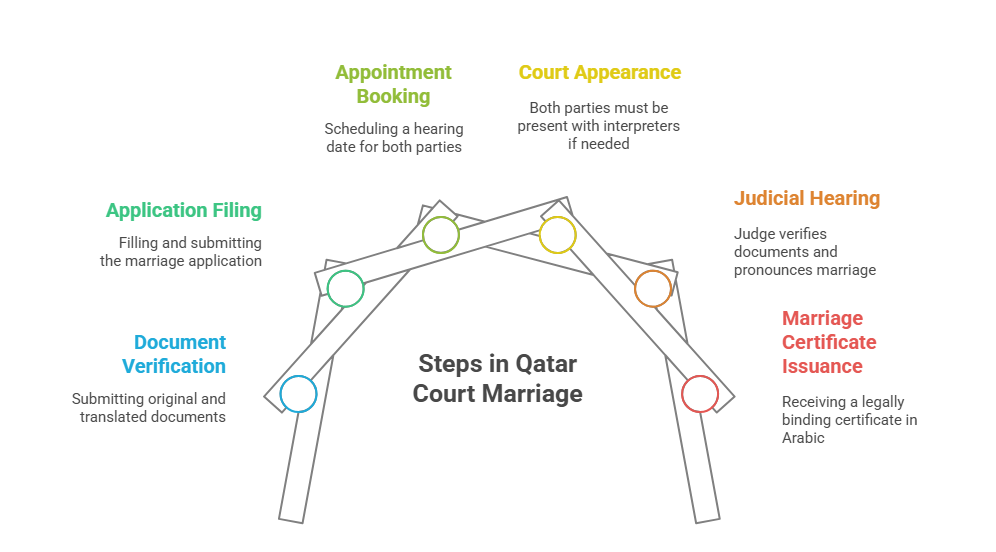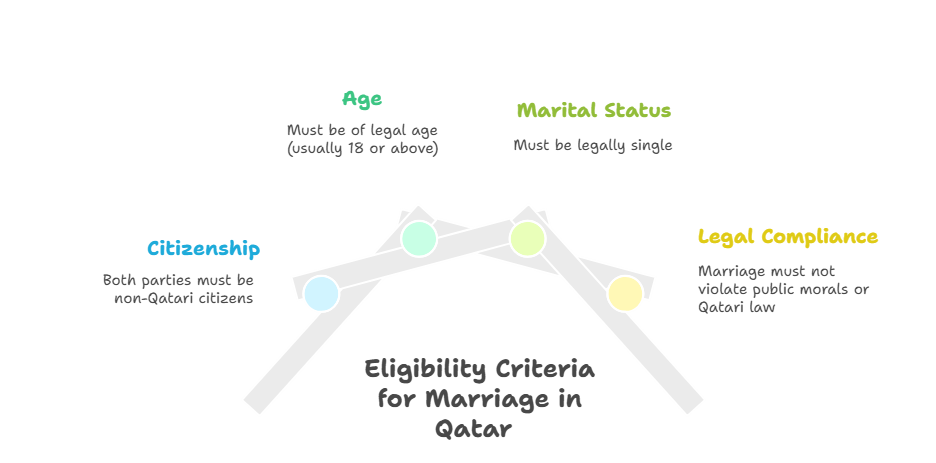
Table of Contents
Court Marriage in Qatar for Foreigners: A Complete Legal Guide
Navigating court marriage in a foreign country can be complex, especially when legal systems, religious considerations, and language barriers are involved. For foreigners residing in or visiting Qatar, court marriage offers a viable legal option, provided the necessary procedures are followed. This guide provides a comprehensive overview of the court marriage process in Qatar for foreign nationals, covering eligibility, documentation, timelines, legal advice, and embassy roles.
Legal Requirements for Court Marriage in Qatar
Court marriage in Qatar is primarily governed by personal status laws and the civil procedures enforced through family courts. While Qatari nationals typically follow Sharia-based procedures, foreign nationals may marry through civil or embassy-based processes, depending on their nationality and religious background.
Who Is Eligible?
Interfaith and Religious Marriage
Foreigners from different religions may face restrictions depending on embassy or court policies. While some embassies allow interfaith marriages, others may not. The Qatari court generally does not officiate interfaith marriages but accepts registration of legally conducted marriages from embassies.
Required Documents for Court Marriage
To initiate a court or embassy marriage, the following documents are typically required:
-
Passports and Qatar Residency Permits (QIDs)
-
Birth Certificates
-
Affidavit of Single Status or Certificate of No Impediment
-
Previous Divorce Decree or Death Certificate of Former Spouse (if applicable)
-
Parental Consent (if below 21 in some countries)
-
Passport-size photographs
-
Embassy-issued No Objection Letter (if required)
-
Certified Translation of Documents (Arabic)
All documents must be duly attested by the Ministry of Foreign Affairs, translated into Arabic by a certified translator, and in some cases, notarized.
Court Marriage Procedure: Step-by-Step

Processing can take between 2 to 4 weeks, depending on court load and document readiness.
Embassy-Based Marriages in Qatar
Some foreign embassies in Qatar (e.g., Philippines, UK, India, France) offer marriage services for their citizens:
-
Embassy Marriages are only valid if both partners are of the same nationality (in most cases).
-
Dual Registration: It’s advisable to register the marriage at both the embassy and the Qatari court to ensure international recognition.
-
Religious Ceremonies may also be conducted in churches or temples, but must be registered.
Interfaith and Religious Considerations
-
Christian Couples: May marry at churches recognized by their embassy and later register the marriage.
-
Muslim + Non-Muslim Couples: Courts in Qatar generally do not process these marriages. Embassy or overseas marriage followed by registration may be advised.
-
Catholic Couples: Require pre-marital counseling and religious certificates; check with the church and embassy.
Legal recognition in Qatar depends on embassy policies and local laws. It's crucial to verify with both parties' embassies before proceeding.
Translation and Notarization of Marriage Documents
All non-Arabic documents must be translated by a certified legal translator and notarized. This includes:
-
Birth Certificates
-
Single Status Affidavits
-
Divorce or Death Certificates
-
Passports (in some cases)
Qatar's Ministry of Justice or authorized translation offices provide notarization. Make sure the translated copies are officially stamped and accepted by the court.
Timelines and Processing Expectations
-
Document Preparation: 1–2 weeks
-
Appointment Booking: 1 week in advance (depending on availability)
-
Court Processing: 1–2 weeks
-
Certificate Issuance: Usually issued within 3–5 business days after the hearing
Urgent applications may be processed faster but require legal assistance or court approval.
Legal Assistance and Lawyer Support
.png)
Lawyers 974 offers a reliable directory of experienced family lawyers in Qatar who specialize in marriage law for expatriates.
Final Checklist Before Your Marriage
-
Confirm eligibility and type of marriage (civil, religious, embassy)
-
Prepare and attest all required documents
-
Get Arabic translations notarized
-
Schedule court or embassy appointment
-
Attend hearing with interpreter if needed
-
Register marriage with both embassy and court if applicable
Conclusion
Court marriage in Qatar for foreigners is not only possible—it can be a smooth, legally secure process with proper guidance. Whether you opt for embassy or court marriage, ensure that all legal protocols are followed, documents are in order, and timelines are respected.
If you’re planning to get married in Qatar, consider consulting a family lawyer listed on Lawyers 974 to navigate the process confidently.
Let your marriage begin with peace of mind and legal clarity.
Disclaimer: This article provides general information and should not be construed as legal advice. Please consult with a qualified and experienced lawyer for personalized guidance regarding your specific situation.

